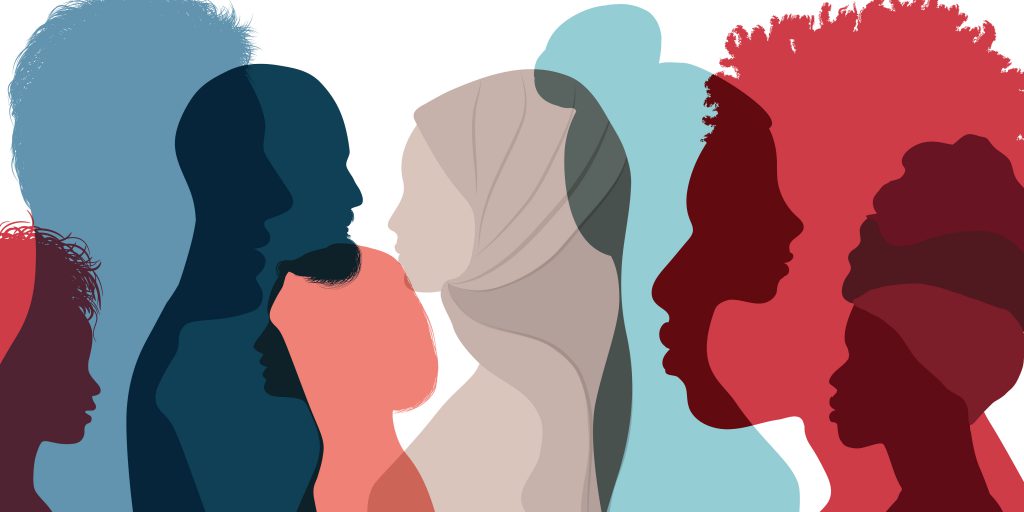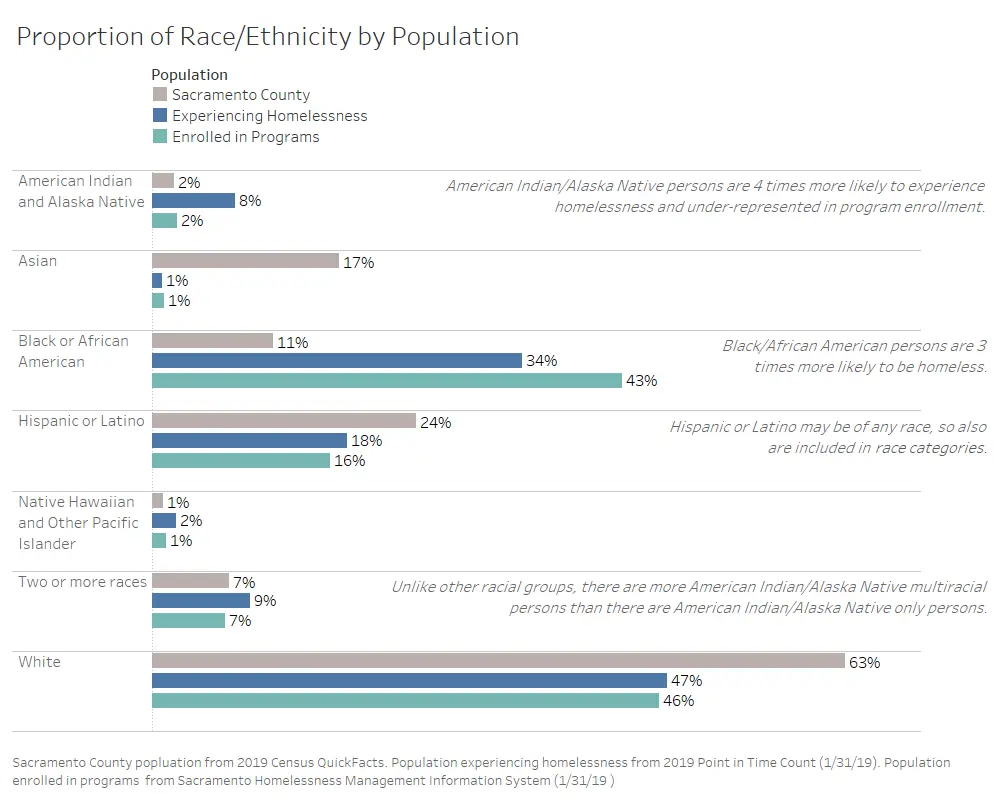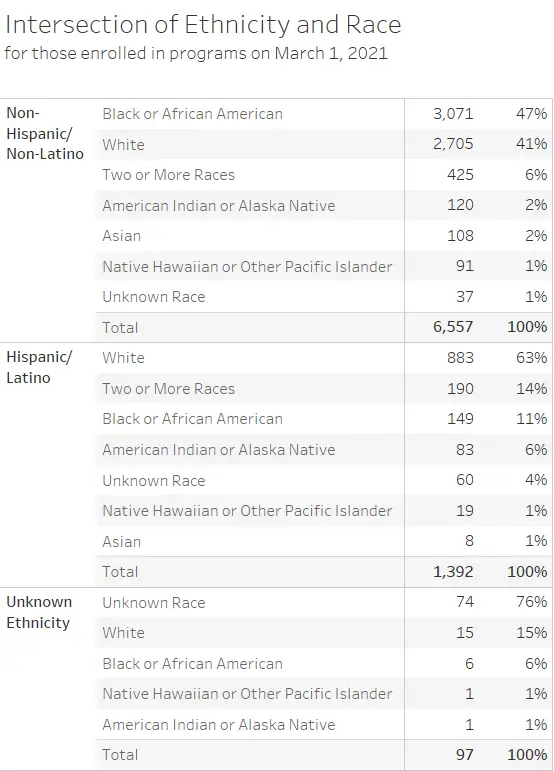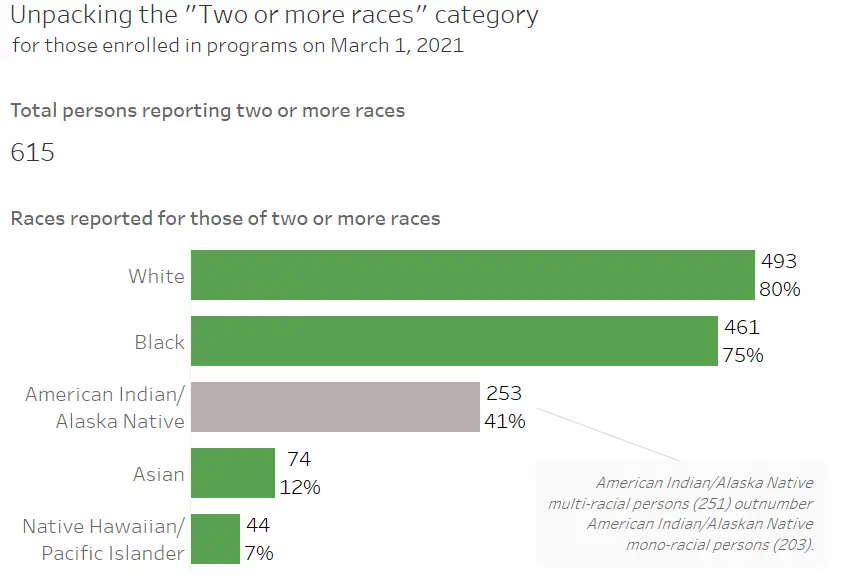Updated: July 12th, 2021

In Sacramento County and across the country, people of color experience homelessness at disproportionately higher rates because of historic and ongoing inequities.
In Sacramento, Black/African Americans persons are three times more likely to experience homelessness than the general population. Meanwhile, American Indian/Alaskan Native persons are four times more likely to experience homelessness than the general population.
The Sacramento Continuum of Care (CoC) Racial Equity Committee (REQC) reviewed available data on homelessness by race and ethnicity and determined that it was important to share the following perspectives on the data.
The data shown below helps us understand the disparity in homelessness experienced by Black, Indigenous, and People of Color (BIPOC). However, the federally mandated language and definitions used to collect and report data does not best serve BIPOC communities.*
Race is a social construct. There exists no clear, reliable distinctions that bind people to the racial categories, which were created as a way to define physical differences between people, and often used as a tool for oppression and violence.
Ethnicity categories are inadequate oversimplifications. We are required to collect data on ethnicity separate from race using two ethnicity choices (“Hispanic or Latino” or “Not Hispanic or Latino”), which neglects the true diversity of shared culture, language, ancestry, practices, and beliefs. In addition, “Hispanic” and “Latino,” which the federal government defines as a “person of Cuban, Mexican, Puerto Rican, South or Central American or other Spanish culture of origin, regardless of race,” are not terms universally embraced by the labelled community. See more data on the intersection of race and ethnicity here.
The data does not reflect the true range of identity and experience. The data reflects the self-identified race and ethnicity of persons experiencing homelessness, but the categories are limiting. For example, the racial category “Asian” groups together a huge number of countries and people of very diverse cultures.
In addition, combining multiracial persons into a category such as “Two or more races,” can mask the true impacts for some racial groups. For example, there are more multi-racial American Indian/Alaska Native persons experiencing homelessness than there are American Indian/Alaska Native mono-racial persons. See more data on who is represented within “Two or more races” here.
The data does not represent the true burden of the housing crisis facing the BIPOC community. By focusing on those who are unsheltered, the federal definition of homelessness leaves out other housing crisis situations that may be more common among some populations, such as over-crowding of multiple families in a unit meant for one or two persons, or couch-surfing.
Qualitative data adds critical context. Interviews and surveys, such as the one undertaken by the REQC in 2021, shed more light on the true burden and challenges faced by BIPOC experiencing homelessness.
Despite the data’s limitations, it is clear there is disparity. The data on this page and other data related to racial equity will be reviewed and updated regularly. If you are interested in learning more and helping address the disparity in homelessness, we encourage you to participate in the REQC meetings.
*Update: In May 2021, HUD communicated upcoming changes to the wording of the race and ethnicity categories based on feedback from communities. The graphics below show the language people were allowed to select from at the time of data collection. See the FY 2022 HMIS Data Standards Change Log on page 2 to learn more about HUD’s revised race and ethnicity definitions.



Sacramento Steps Forward is a private, non-profit 501(c)(3) charity serving the Sacramento region. EIN# 27-4907397
Get news and updates from Sacramento Steps Forward in your inbox.